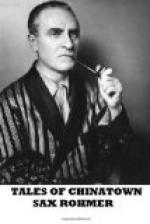You have heard him play, and it is therefore unnecessary for me to attempt to describe the effect of that music. The only composition which ever bore his name—I refer to “The Black Mass”—affected me on every occasion when I heard it, as no other composition has ever done.
Perhaps it was Tcheriapin’s playing rather than the music itself which reached down into hitherto un-plumbed depths within me and awakened dark things which, unsuspected, lay there sleeping. I never heard “The Black Mass” played by anyone else; indeed, I am not aware that it was ever published. But had it been we should rarely hear it. Like Locke’s music to “Macbeth” it bears an unpleasant reputation; to include it in any concert programme would be to court disaster. An idle superstition, perhaps, but there is much naivete in the artistic temperament.
Men detested Tcheriapin, yet when he chose he could win over his bitterest enemies. Women followed him as children followed the Pied Piper; he courted none, but was courted by all. He would glance aside with those black, slanting eyes, shrug in his insolent fashion, and turn away. And they would follow. God knows how many of them followed—whether through the dens of Limehouse or the more fashionable salons of vice in the West End—they followed—perhaps down to Hell. So much for Tcheriapin.
At the time when the episode occurred to which I have referred, Dr. Kreener occupied a house in Regent’s Park, to which, when his duties at the munition works allowed, he would sometimes retire at week-ends. He was a man of complex personality. I think no one ever knew him thoroughly; indeed, I doubt if he knew himself.
He was hail-fellow-well-met with the painters, sculptors, poets, and social reformers who have made of Soho a new Mecca. No movement in art was so modern that Dr. Kreener was not conversant with it; no development in Bolshevism so violent or so secret that Dr. Kreener could not speak of it complacently and with inside knowledge.
These were his Bohemian friends, these dreamers and schemers. Of this side of his life his scientific colleagues knew little or nothing, but in his hours of leisure at Regent’s Park it was with these dreamers that he loved to surround himself rather than with his brethren of the laboratory. I think if Dr. Kreener had not been a great chemist he would have been a great painter, or perhaps a politician, or even a poet. Triumph was his birthright, and the fruits for which lesser men reached out in vain fell ripe into his hands.
The favourite meeting-place for these oddly assorted boon companions was the doctor’s laboratory, which was divided from the house by a moderately large garden. Here on a Sunday evening one might meet the very “latest” composer, the sculptor bringing a new “message,” or the man destined to supplant with the ballet the time-worn operatic tradition.
But while some of these would come and go, so that one could never count with certainty upon meeting them, there was one who never failed to be present when such an informal reception was held. Of him I must speak at greater length, for a reason which will shortly appear.




